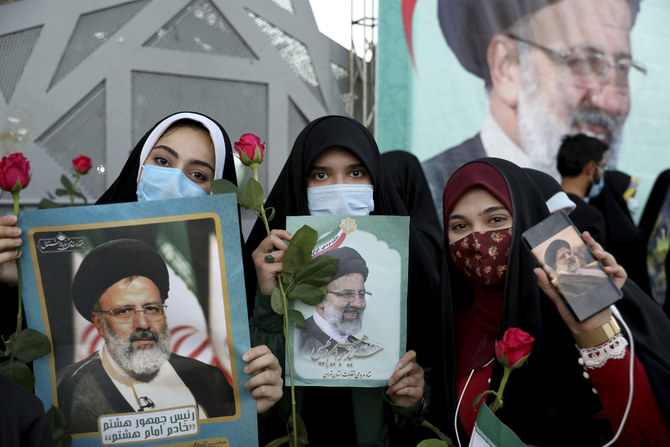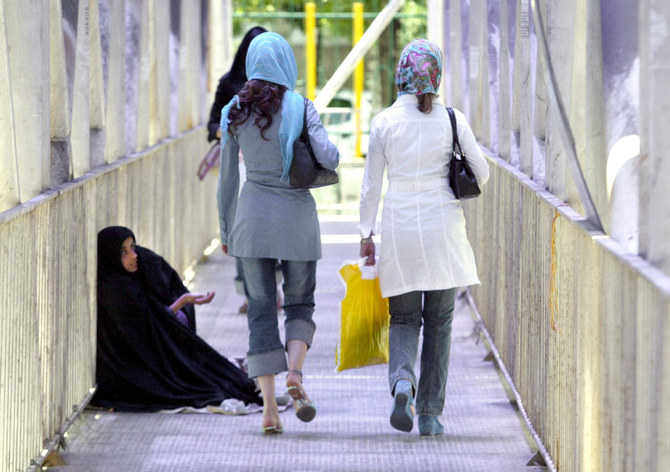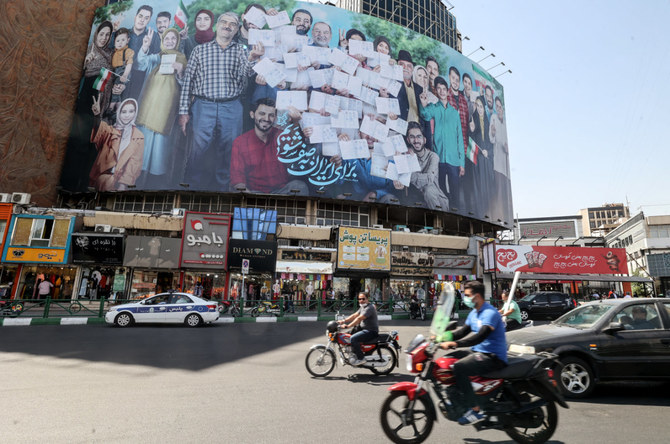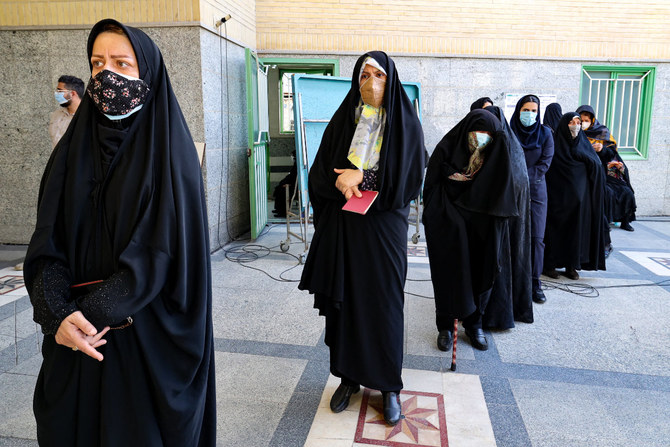MISSOURI, US / IRBIL, Iraqi Kurdistan: A popular Persian music video from several years back features a long line of sullen-looking people waiting to be served at a cafeteria. When their turn comes to choose, we see the grim-faced chef offer them the option of maggot-filled mystery meat or slime filled with flies.
Many Iranian artists engage in such oblique attacks on the clerical ruling class since direct criticism of the basic parameters of the political system remains forbidden. The victory of ultraconservative cleric Ebrahim Raisi in Friday’s presidential election highlighted Iranians’ lack of choice in such matters more than ever.
While it is not uncommon for voters in many countries to complain of lack of meaningful choice in elections, the Iranian case takes this phenomenon to new heights. The Guardian Council, an unelected body of clerics and jurists (three of whom were appointed by Raisi), vets would-be political candidates.
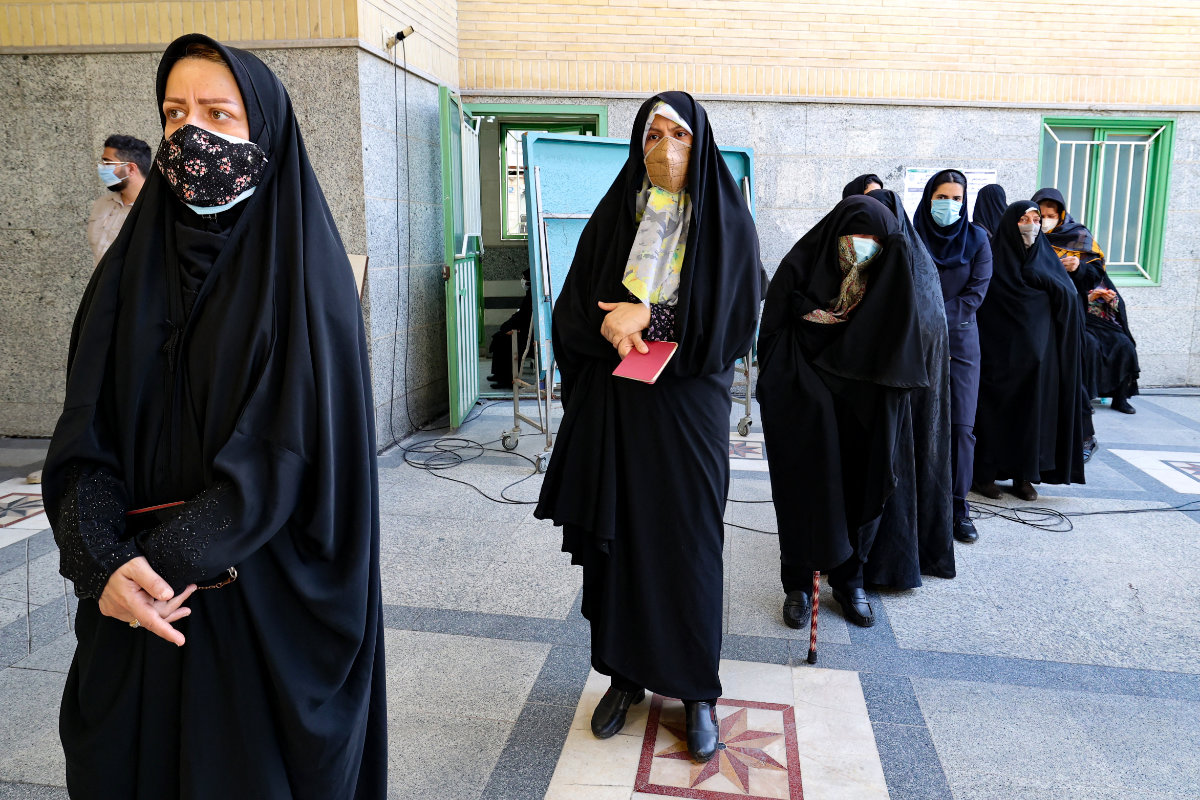
Voter turnout for Iran’s presidential poll was the lowest in decades. (AFP)
By many estimates, the council rejects more than 90 percent of applicants who go through the trouble of applying to run for political office. This year it rejected the candidacy of not only popular reformist candidates allied with outgoing President Hassan Rouhani, but also of populist hardliners as well.
The list of candidates forbidden to run in the election thus included current vice-president Eshaq Jahingiri, Speaker of the Parliament Ali Larijani (both allied with Rouhani), and the rightwing populist former president Mahmoud Ahmedinejad. These are former political leaders of Iran, among the few allowed to run in previous elections and whose support for the basic tenets of the Islamic Republic seems beyond doubt.
Yet the Guardian Council still deemed them too much of a threat and disqualified their candidacy (along with that of any women, who are all barred from running in such elections). Unsurprisingly in such a climate, voter turnout appeared to have been the lowest in decades.
How to judge the legitimacy of the Iranian presidential election then?
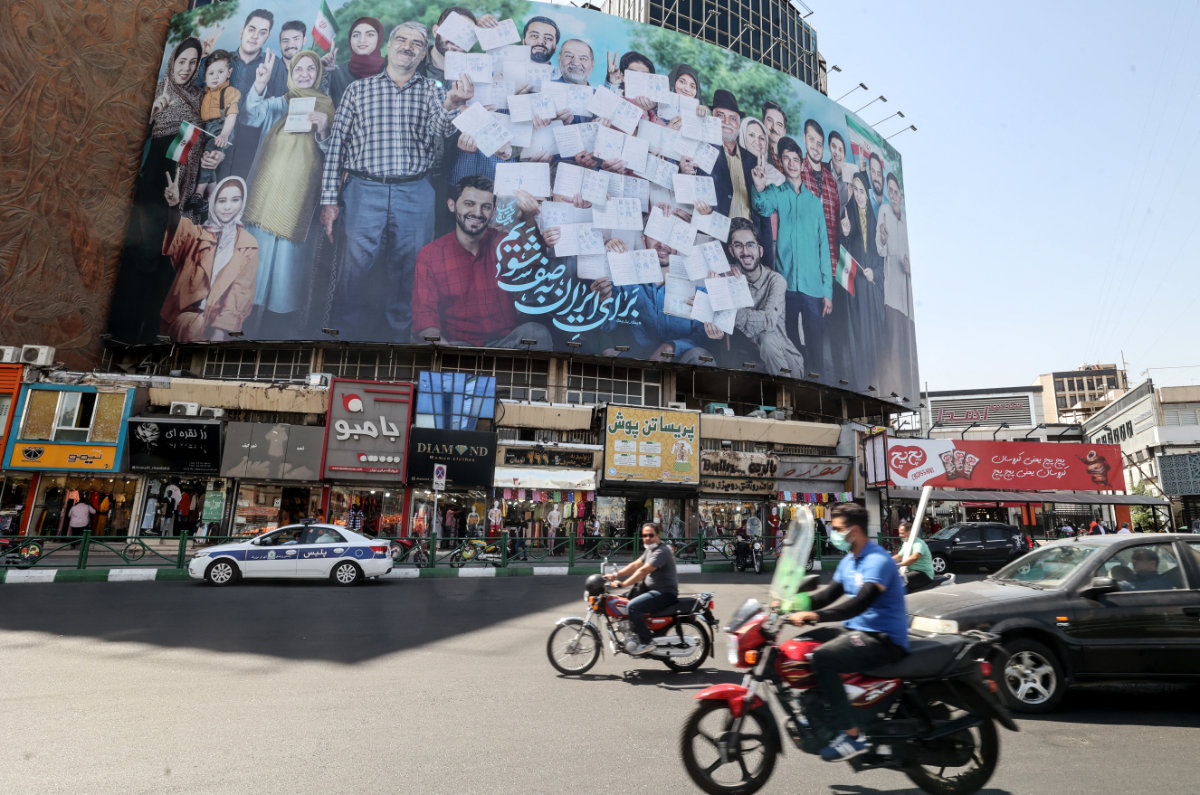
An electoral campaign poster covers the facade of a building on Valiasr Square in Iran's capital Tehran on June 19, 2021, a day after the presidential election. (AFP / Atta Kenare)
“That depends on how you define ‘legitimate’,” Barbara Slavin, director of the Future of Iran Initiative at the Atlantic Council, told Arab News. “The Guardian Council has always vetted out any candidates seen as insufficiently loyal to the system, although never before had the definition of ‘loyal’ contracted as much as it seemed to have for this election.”
Much less charitable than Slavin is Arash Azizi, author of “The Shadow Commander: Soleimani, the US, and Iran’s Global Ambitions.” “Raisi won pretty much the same number of votes in 2021 as he had in 2017 as the losing candidate. But he won this time because the majority of people boycotted the elections,” Azizi told Arab News.
“Even if we believe the official figure, this is the lowest turnout in the history of the Islamic Republic, and the first time a majority have not voted in a presidential election. Not to mention the nearly four million voters who spoiled their ballots.”
Aside from the lack of choice in political candidates, the most important decision-making posts in the country are not elected in any case. The supreme leader — currently Ayatollah Khamenei, who took over from Ayatollah Khomeini in 1989 — is nominally chosen by the Assembly of Experts. The heads of the Islamic Revolutionary Guard Corps (IRGC) are likewise not elected but make many of the most important policy decisions in the country.

Iran's Supreme Leader Ayatollah Ali Khamenei. (AFP)
“Iranians were frustrated at the lack of choice and pessimistic about the prospects for a better life under this regime,” Slavin told Arab News. “For 25 years, they have turned out in large numbers in presidential elections in hopes of achieving peaceful evolutionary change.
“But while Iranian society has progressed, the system has become more repressive and less representative. Also, not voting is a form of protest in a system that regards voting as a patriotic duty.”
IRAN’S POLITICAL ECONOMY IN NUMBERS
40 percent - Iran’s inflation rate in 2019.
5 percent - Jump in poverty rate over past two years.
3.7 million - People added to poverty roll in this period.
83 million - Population of Iran in 2019.
In the past, Khamenei and IRGC commanders preferred to allow limited choice in presidential elections and refrained from intervening too directly or obviously in the political process.
They would use the very restricted electoral system to gauge the popular mood, try and gain some legitimacy by claiming a democratic mandate, and sit back to see what political cards various elites in Iranian society would try to brandish.
Only when he perceived Iran to be veering too far off course would Khamenei step in publicly to make a correction.
Behind the scenes, of course, such unelected leaders played an active role in nearly everything, from economic policy and directives regarding executions of political prisoners to the strategy of Iran’s nuclear negotiations and other matters such as covert operations abroad and funding of various Iranian proxy forces in the region.

Rising poverty, growing unrest and an economy in crisis have rattled the Tehran regime. (AFP)
An economy in crisis and a growing number of popular protests in recent years seem to have rattled the regime, however. Under such conditions, the real leadership fears allowing Iranians even a semblance of choice in this year’s election.
Raisi’s appointment to the presidency therefore probably represents a message to the Iranian people most of all. A protege of Khamenei, Raisi is blamed by Iranian activists for the executions of tens of thousands of dissidents during the past three decades. They also claim that Raisi, as a junior prosecutor in the 1980s, headed “death committees” that buried slain political prisoners in mass graves in 1988.
According to the Center for Human Rights in Iran, at that time Ayatollah Hossein Ali Montazeri, who was then the heir apparent to Ayatollah Khomeini, even condemned the death committees, saying: “I believe this is the greatest crime committed in the Islamic Republic since the 1979 revolution and history will condemn us for it … . History will write you down as criminals.”
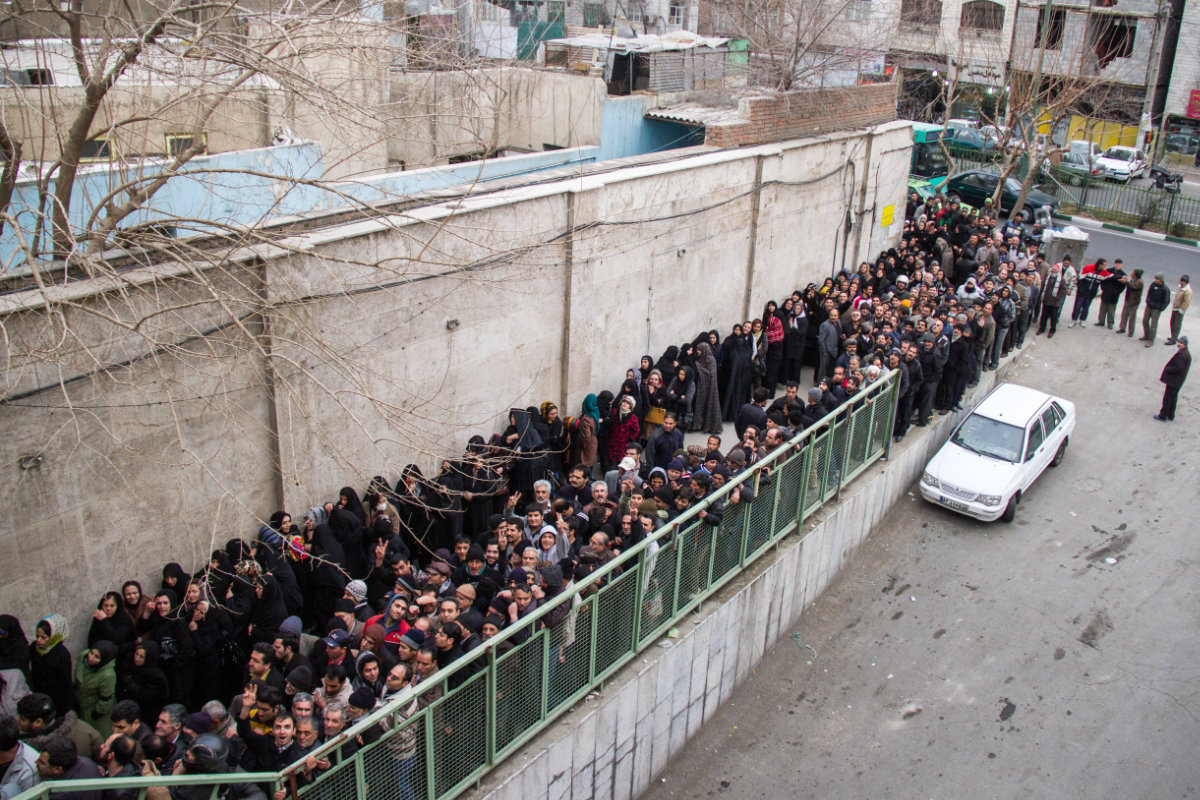
Iranian President Hassan Rouhani faced harsh criticism from conservatives today over a poorly implemented scheme to distribute food to low-income families in the sanctions-hit Islamic republic.(AFP file photo)
Even today, Iran stands second only to China — a much larger country — in the number of executions it carries out every year. These are carried out after closed-door kangaroo trials in which defendants are not allowed to even see the evidence against them or confront their accusers, with a disproportionate number of accused coming from ethnic and religious minorities in Iran. Iranian Kurds make up roughly half of those executed, although they constitute less than half of Iran’s population.
Raisi takes up the post of president after serving as chief of the judiciary that oversaw this system and its mass executions of dissidents. Before becoming chief justice in 2019, he served as attorney general (2014–2016), deputy chief justice (2004–2014), and prosecutor and deputy prosecutor of Tehran in the 1980s and 1990s.
He is the first Iranian official to enter the presidency while already under US and European sanctions for his past involvement in human rights abuses.
The message to the Iranian people would therefore seem quite clear: You must behave and stay in line or else.
“Khamenei and the clerical establishment have long made a conscious decision to drive out all political competition. The reformists were drowned in blood once the 2009 Iranian Green movement was crushed, with many of its leaders sent to jail for years and its main political parties banned,” Azizi told Arab News.
“The centrist wing of the regime, represented by Rouhani, was also subsequently pushed out of major positions of power. The pro-Khamenei conservatives now control the iudiciary, the parliament and the presidency. The latter two became possible only after all major electoral rivals were thrown out by the Guardian Council.”
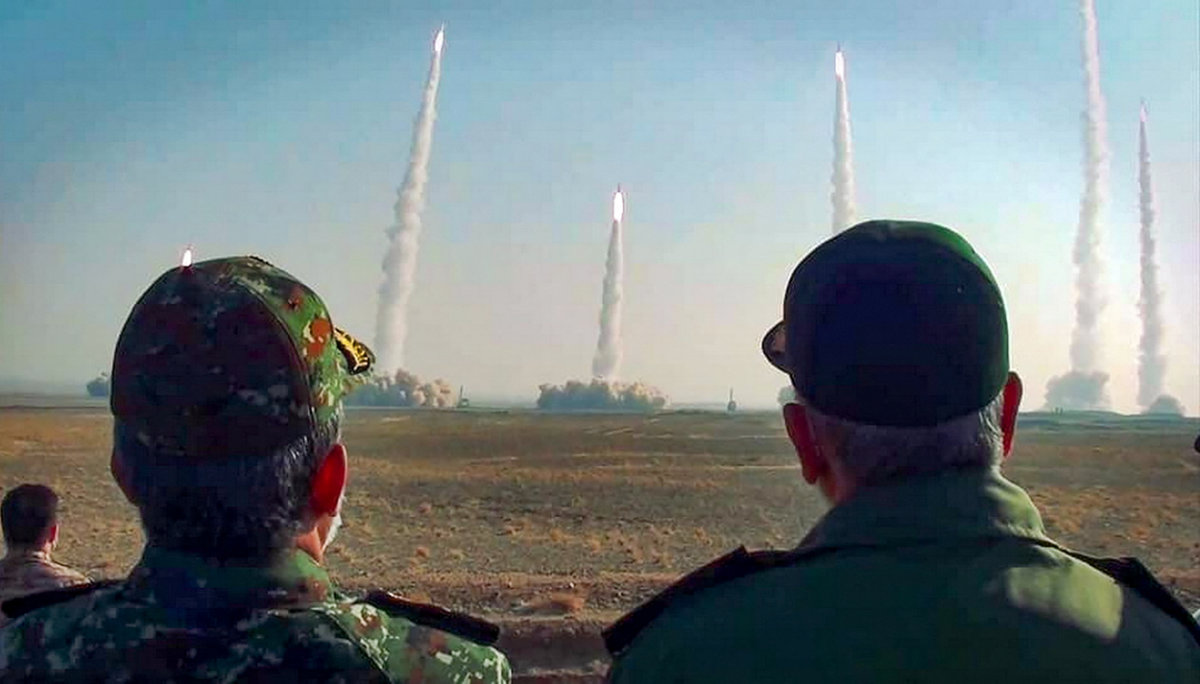
Hassan Rouhani's moderate leadership was reportedly sidelined in conducting foreign policy by the warmongering Iran's Revolutionary Guard Corps (IRGC). (AFP file photo)
Comparing the present situation to the abolition in 1975 of the multi-party system by the shah of Iran, Azizi said: “This is very much the Islamic Republic’s 1975 one-party state moment as some historians have pointed out. The regime might come to regret the day it turned itself into an ever more monolithic entity.”
Looking to the future, the Atlantic Council’s Slavin says a more pertinent question now than the presidential election’s legitimacy is whether the Raisi administration can improve life for ordinary Iranians as “that will be the determinant of its legacy.”
“Iranians may hope to see a slightly better economy if Tehran comes back into compliance with the 2015 nuclear deal and sanctions are lifted again,” she said.
“But much depends on the competence or lack thereof of Raisi’s team and the appetite or lack thereof of foreign companies to invest in Iran. I would expect repression of dissent to continue and even accelerate.”
Azizi believes Raisi’s election will not lead to quick changes in people’s lives or a sharp turn in policies. “He will tread carefully as his main goal is to prepare for the day when Khamenei’s death brings a succession crisis and he can be in line to become the supreme leader,” he told Arab News.
“Interestingly enough, Rouhani’s chief of staff Mahmod Vaezi recently speculated that people’s lives might improve under Raisi since there will be dealings with the West, possibly even a deal before Raisi takes office, which should take some pressure off the economy.”
That being said, what might Raisi’s elevation to the presidency mean for Iran’s relations with other countries?
Compared with the more affable and moderate Rouhani, Raisi seems less likely, able or willing to lead an Iranian charm offensive abroad. The style of Iranian diplomacy may therefore change a bit, but the substance or Iranian policy will likely differ little from that of the previous administration.
Rouhani was not the one making the most important Iranian foreign policy choices in any case. He was, along with his foreign minister, Mohammad Javad Zarif, just the messenger.
“Iran’s policy in the Arab world was neither made nor implemented by the Rouhani administration, so a change in presidency won’t bring an immediate change on this count,” Azizi told Arab News. “But the IRGC will find more unrestricted access to state structures it doesn’t already control and will have a freer hand in regional adventures.”
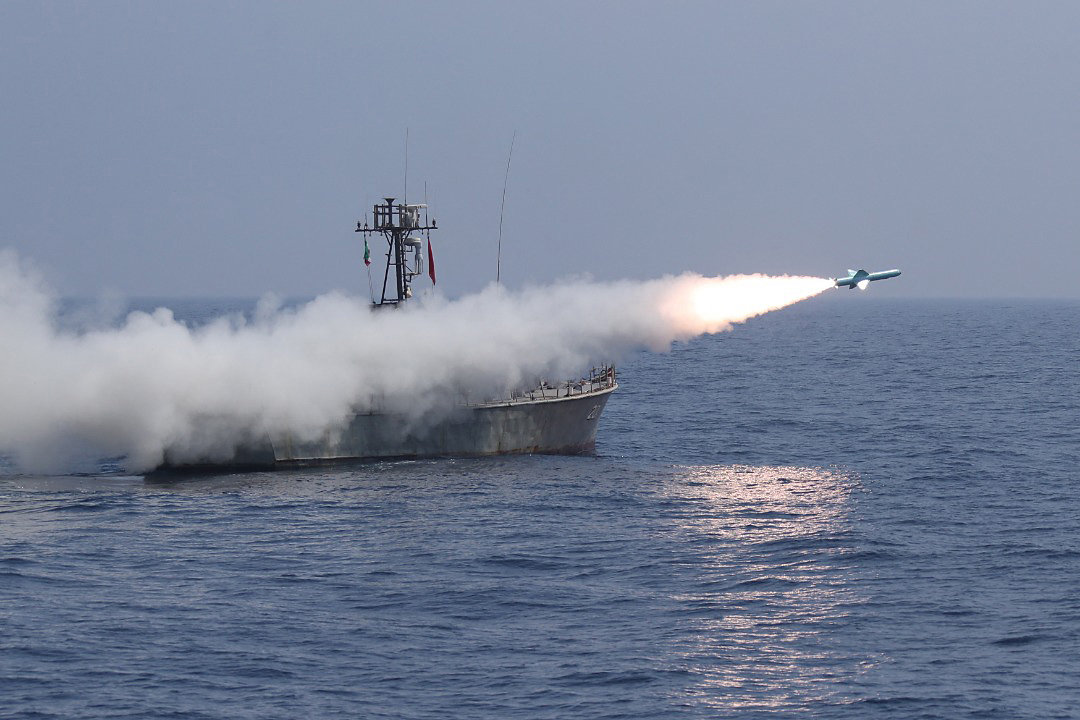
With an ultraconservative sitting as president, the IRGC will have a freer hand in regional troublemaking adventures, critics warn. (Iranian Army Office photo via AFP)
Slavin takes a more nuanced view of Iranian ambitions under Raisi’s watch. “I see him as risk-averse in foreign affairs in part because he hopes to succeed Khamenei,” she told Arab News.
“I think he will focus on stabilizing the economy and try to reduce tensions with the neighbors. However, he is not in charge of relations with the various militia groups. That will remain within the purview of the Quds Force.”
Tellingly, Raisi has made statements in the past indicating his willingness to accept international sanctions on Iran. He views such sanctions as an opportunity for Iran to further develop its own independent, “resistance” economy.
For ultraconservatives like him, too deep an integration with the world economy risks cultural and political perversion of Iran, so anything short of an American military invasion may be perfectly fine for Raisi and his mentor, Khamenei.
The Biden administration, which remains very much interested in resuming the nuclear accord, may thus find it difficult to negotiate with someone who does not seem to mind sanctions and a certain amount of isolation.
However, Azizi thinks the regime will try to seal a deal to get Washington to rejoin the nuclear accord before Raisi takes office in August. “Raisi will thus inherit this deal and maintain it,” he said, although some IRGC elements will be pushing him to permit “more adventurous stuff in the region” and reject Gulf states’ reconciliation and talks offers.
“How amenable he is to such pressure is an open question,” Azizi told Arab News.


